2013 is looking very fruitful, readers. While last year offered new work from Zadie Smith, Junot Díaz, Michael Chabon, and many more, this year we’ll get our hands on new George Saunders, Karen Russell, Jamaica Kincaid, Anne Carson, Colum McCann, Aleksandar Hemon and even Vladimir Nabokov and J.R.R. Tolkien, as well as, beyond the horizon of summer, new Paul Harding, Jonathan Lethem, and Thomas Pynchon. We’ll also see an impressive array of anticipated work in translation from the likes of Alejandro Zambra, Ma Jian, László Krasznahorkai, Javier Marías and Karl Ove Knausgaard, among others. But these just offer the merest hint of the literary plenty that 2013 is poised to deliver. A bounty that we have tried to tame in another of our big book previews.
The list that follows isn’t exhaustive – no book preview could be – but, at 7,900 words strong and encompassing 79 titles, this is the only 2013 book preview you will ever need.
January or Already Out:
 Tenth of December by George Saunders: Tenth of December is George Saunders at his hilarious, heartbreaking best, excavating modern American life in a way that only he can. In “Home,” a soldier returns from the wars in Afghanistan and Iraq to a deteriorating family situation. In “Victory Lap,” a botched abduction is told from three very different perspectives. Tenth of December has already prompted an all-out rave profile from the New York Times. And for those George Saunders super fans out there, yes, there is a story set at a theme park. (Patrick)
Tenth of December by George Saunders: Tenth of December is George Saunders at his hilarious, heartbreaking best, excavating modern American life in a way that only he can. In “Home,” a soldier returns from the wars in Afghanistan and Iraq to a deteriorating family situation. In “Victory Lap,” a botched abduction is told from three very different perspectives. Tenth of December has already prompted an all-out rave profile from the New York Times. And for those George Saunders super fans out there, yes, there is a story set at a theme park. (Patrick)
 Going Clear: Scientology, Hollywood, and the Prison of Belief by Lawrence Wright: While Wright was working on his 25,000-word take-down of the Church of Scientology for The New Yorker (where he is a staff writer), a spokesman for the organization showed up with four lawyers and 47 binders of documentation. “I suppose the idea was to drown me in information,” Wright recently told the Times, “but it was like trying to pour water on a fish.” The investigation has blossomed into a full-length book that’s shaping up to be as controversial as anything that crosses Scientology’s path: Wright has been receiving numerous legal missives from the church itself and the celebrities he scrutinizes, and his British publisher has just backed out—though they claim they haven’t been directly threatened by anyone. (Elizabeth)
Going Clear: Scientology, Hollywood, and the Prison of Belief by Lawrence Wright: While Wright was working on his 25,000-word take-down of the Church of Scientology for The New Yorker (where he is a staff writer), a spokesman for the organization showed up with four lawyers and 47 binders of documentation. “I suppose the idea was to drown me in information,” Wright recently told the Times, “but it was like trying to pour water on a fish.” The investigation has blossomed into a full-length book that’s shaping up to be as controversial as anything that crosses Scientology’s path: Wright has been receiving numerous legal missives from the church itself and the celebrities he scrutinizes, and his British publisher has just backed out—though they claim they haven’t been directly threatened by anyone. (Elizabeth)
 Umbrella by Will Self: Shortly before Umbrella came out in the UK last September, Will Self published an essay in The Guardian about how he’d gone modernist. “As I’ve grown older, and realised that there aren’t that many books left for me to write, so I’ve become determined that they should be the fictive equivalent of ripping the damn corset off altogether and chucking it on the fire.” Umbrella is the result of Self’s surge in ambition, and it won him some of the best reviews of his career, as well as his first Booker shortlisting. He lost out to Hilary Mantel in the end, but he won the moral victory in the group photo round by doing this. (Mark)
Umbrella by Will Self: Shortly before Umbrella came out in the UK last September, Will Self published an essay in The Guardian about how he’d gone modernist. “As I’ve grown older, and realised that there aren’t that many books left for me to write, so I’ve become determined that they should be the fictive equivalent of ripping the damn corset off altogether and chucking it on the fire.” Umbrella is the result of Self’s surge in ambition, and it won him some of the best reviews of his career, as well as his first Booker shortlisting. He lost out to Hilary Mantel in the end, but he won the moral victory in the group photo round by doing this. (Mark)
 Revenge by Yoko Ogawa: English-reading fans of the prolific and much-lauded Yoko Ogawa rejoice at the advent of Revenge, a set of eleven stories translated from Japanese by Stephen Snyder. The stories, like Ogawa’s other novels (among them The Diving Pool, The Housekeeper and the Professor, and Hotel Iris) are purportedly elegant and creepy. (Lydia)
Revenge by Yoko Ogawa: English-reading fans of the prolific and much-lauded Yoko Ogawa rejoice at the advent of Revenge, a set of eleven stories translated from Japanese by Stephen Snyder. The stories, like Ogawa’s other novels (among them The Diving Pool, The Housekeeper and the Professor, and Hotel Iris) are purportedly elegant and creepy. (Lydia)
 Ways of Going Home by Alejandro Zambra: Drop the phrase “Chilean novelist” and literary minds automatically flock to Bolaño. However, Alejandro Zambra is another name those words should soon conjure if they don’t already. Zambra was named one of Granta’s Best Young Spanish Language Novelists in 2010, and his soon-to-be-released third novel, Ways of Going Home, just won a PEN translation award. The novel has dual narratives: a child’s perspective in Pinochet’s Chile and an author’s meditation on the struggle of writing. In Zambra’s own words (from our 2011 interview): “It’s a book about memory, about parents, about Chile. It’s about the 80s, about the years when we children were secondary characters in the literature of our parents. It’s about the dictatorship, as well, I guess. And about literature, intimacy, the construction of intimacy.” (Anne)
Ways of Going Home by Alejandro Zambra: Drop the phrase “Chilean novelist” and literary minds automatically flock to Bolaño. However, Alejandro Zambra is another name those words should soon conjure if they don’t already. Zambra was named one of Granta’s Best Young Spanish Language Novelists in 2010, and his soon-to-be-released third novel, Ways of Going Home, just won a PEN translation award. The novel has dual narratives: a child’s perspective in Pinochet’s Chile and an author’s meditation on the struggle of writing. In Zambra’s own words (from our 2011 interview): “It’s a book about memory, about parents, about Chile. It’s about the 80s, about the years when we children were secondary characters in the literature of our parents. It’s about the dictatorship, as well, I guess. And about literature, intimacy, the construction of intimacy.” (Anne)
 Scenes from Early Life by Philip Hensher: In his eighth novel, Scenes from Early Life, Philip Hensher “shows for the first time what [he] has largely concealed in the past: his heart,” writes Amanda Craig in The Independent. Written in the form of a memoir, narrated in the voice of Hensher’s real-life husband Zaved Mahmood, the novel invites comparison with Gertrude Stein’s The Autobiography of Alice B. Toklas. Described as a hybrid of fiction, history, and biography—and as both “clever” and “loving”—the inventive project here is distinctly intriguing. (Sonya)
Scenes from Early Life by Philip Hensher: In his eighth novel, Scenes from Early Life, Philip Hensher “shows for the first time what [he] has largely concealed in the past: his heart,” writes Amanda Craig in The Independent. Written in the form of a memoir, narrated in the voice of Hensher’s real-life husband Zaved Mahmood, the novel invites comparison with Gertrude Stein’s The Autobiography of Alice B. Toklas. Described as a hybrid of fiction, history, and biography—and as both “clever” and “loving”—the inventive project here is distinctly intriguing. (Sonya)
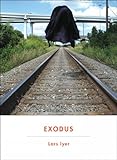 Exodus by Lars Iyer: Exodus, which follows Spurious and Dogma, is the eminently satisfying and unexpectedly moving final installment in a truly original trilogy about two wandering British intellectuals—Lars and W., not to be confused with Lars Iyer and his real friend W., whom he’s been quoting for years on his blog—and their endless search for meaning in a random universe, for true originality of thought, for a leader, for better gin. (Emily M.)
Exodus by Lars Iyer: Exodus, which follows Spurious and Dogma, is the eminently satisfying and unexpectedly moving final installment in a truly original trilogy about two wandering British intellectuals—Lars and W., not to be confused with Lars Iyer and his real friend W., whom he’s been quoting for years on his blog—and their endless search for meaning in a random universe, for true originality of thought, for a leader, for better gin. (Emily M.)
February:
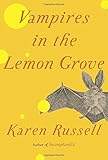 Vampires in the Lemon Grove by Karen Russell: Russell’s short stories are marked by superb follow-through: many succeed due to her iron-clad commitment to often fantastical conceits, like the title story of her first collection, St. Lucy’s Home for Girls Raised by Wolves, which draws a powerful metaphor for adolescent girlhood in an actual orphanage for girls raised by wolves. Last year saw her debut novel, Swamplandia!, nominated for the Pulitzer prize; this year, her second short story collection—and another batch of fantastical conceits—finally arrives. Just imagine the characters in this title story, trying to quell their bloodlust, sinking their fangs into lemons under the Italian sun. (Elizabeth)
Vampires in the Lemon Grove by Karen Russell: Russell’s short stories are marked by superb follow-through: many succeed due to her iron-clad commitment to often fantastical conceits, like the title story of her first collection, St. Lucy’s Home for Girls Raised by Wolves, which draws a powerful metaphor for adolescent girlhood in an actual orphanage for girls raised by wolves. Last year saw her debut novel, Swamplandia!, nominated for the Pulitzer prize; this year, her second short story collection—and another batch of fantastical conceits—finally arrives. Just imagine the characters in this title story, trying to quell their bloodlust, sinking their fangs into lemons under the Italian sun. (Elizabeth)
 My Brother’s Book by Maurice Sendak: When Maurice Sendak died last May he left one, final, unpublished book behind. It is, according to a starred review in Publisher’s Weekly, a beautiful, intensely serious elegy for Sendak’s beloved older brother Jack, who died in 1995. The story, illustrated in watercolors, has Guy (a stand-in for Sendak), journeying down the gullet of a massive polar bear named Death- “Diving through time so vast—sweeping past paradise”- into an underworld where he and Jack have one last reunion. “To read this intensely private work,” writes Publisher’s Weekly, “is to look over the artist’s shoulder as he crafts his own afterworld, a place where he lies in silent embrace with those he loves forever.” (Kevin)
My Brother’s Book by Maurice Sendak: When Maurice Sendak died last May he left one, final, unpublished book behind. It is, according to a starred review in Publisher’s Weekly, a beautiful, intensely serious elegy for Sendak’s beloved older brother Jack, who died in 1995. The story, illustrated in watercolors, has Guy (a stand-in for Sendak), journeying down the gullet of a massive polar bear named Death- “Diving through time so vast—sweeping past paradise”- into an underworld where he and Jack have one last reunion. “To read this intensely private work,” writes Publisher’s Weekly, “is to look over the artist’s shoulder as he crafts his own afterworld, a place where he lies in silent embrace with those he loves forever.” (Kevin)
 Benediction by Kent Haruf: Kent Haruf’s previous novels, which include Plainsong and Eventide, have all taken place in the fictional Colorado town of Holt, which is based on the real life city of Yuma. His newest work is no exception. It is a network of family dramas in a small town, most of which revolve around loss or impending loss, strained relationships, and efforts to grapple, together, with the pain the characters face in their own lives and feel in the lives of those around them. (Kevin)
Benediction by Kent Haruf: Kent Haruf’s previous novels, which include Plainsong and Eventide, have all taken place in the fictional Colorado town of Holt, which is based on the real life city of Yuma. His newest work is no exception. It is a network of family dramas in a small town, most of which revolve around loss or impending loss, strained relationships, and efforts to grapple, together, with the pain the characters face in their own lives and feel in the lives of those around them. (Kevin)
 See Now Then by Jamaica Kincaid: For See Now Then, her first novel in a decade, Jamaica Kincaid settles into a small town in Vermont, where she dissects the past, present and future of the crumbling marriage of Mrs. Sweet, mother of two children named Heracles and Persephone, a woman whose composer husband leaves her for a younger musician. Kincaid is known as a writer who can see clean through the surface of things – and people – and this novel assures us that “Mrs. Sweet could see Mrs. Sweet very well.” (Bill)
See Now Then by Jamaica Kincaid: For See Now Then, her first novel in a decade, Jamaica Kincaid settles into a small town in Vermont, where she dissects the past, present and future of the crumbling marriage of Mrs. Sweet, mother of two children named Heracles and Persephone, a woman whose composer husband leaves her for a younger musician. Kincaid is known as a writer who can see clean through the surface of things – and people – and this novel assures us that “Mrs. Sweet could see Mrs. Sweet very well.” (Bill)
 The Bridge Over the Neroch: And Other Works by Leonid Tsypkin: Like Chekhov, Tsypkin was a doctor by trade. In fact, that was all most people knew him as during his lifetime. At the time of Tsypkin’s death, his novel Summer in Baden-Baden, one of the most beautiful to come out of the Soviet Era, remained unpublished, trapped in a drawer in Moscow. Now New Directions brings us the “remaining writings”: a novella and several short stories. (Garth)
The Bridge Over the Neroch: And Other Works by Leonid Tsypkin: Like Chekhov, Tsypkin was a doctor by trade. In fact, that was all most people knew him as during his lifetime. At the time of Tsypkin’s death, his novel Summer in Baden-Baden, one of the most beautiful to come out of the Soviet Era, remained unpublished, trapped in a drawer in Moscow. Now New Directions brings us the “remaining writings”: a novella and several short stories. (Garth)
 How Literature Saved My Life by David Shields: Like his 2008 book The Thing About Life is that One Day You’ll Be Dead, which was nearly as much a biology text book as it was a memoir, How Literature Saved My Life obstinately evades genre definitions. It takes the form of numerous short essays and fragments of oblique meditation on life and literature; and, as you’d expect from the author of Reality Hunger, it’s heavily textured with quotation. Topics include Shields’s identification with such diverse fellows as Ben Lerner (his “aesthetic spawn”) and George W. Bush, the fundamental meaninglessness of life, and the continued decline of realist narrative fiction. (Mark)
How Literature Saved My Life by David Shields: Like his 2008 book The Thing About Life is that One Day You’ll Be Dead, which was nearly as much a biology text book as it was a memoir, How Literature Saved My Life obstinately evades genre definitions. It takes the form of numerous short essays and fragments of oblique meditation on life and literature; and, as you’d expect from the author of Reality Hunger, it’s heavily textured with quotation. Topics include Shields’s identification with such diverse fellows as Ben Lerner (his “aesthetic spawn”) and George W. Bush, the fundamental meaninglessness of life, and the continued decline of realist narrative fiction. (Mark)
 The City of Devi by Manil Suri: Manil Suri is perhaps best known for his first novel The Death of Vishnu, which was long-listed for the Booker and shortlisted for the 2002 PEN/Faulkner Award. The City of Devi, his third novel, takes place in a Mumbai emptied out under threat of nuclear attack. Sarita, a 33-year-old statistician, stays in the city to find her beloved husband, who has mysteriously vanished. She ends up teaming up with a gay Muslim man named Jaz, and together they travel across this dangerous and absurd and magical landscape. According to Keran Desai, this is Suri’s “bravest and most passionate book,” which combines “the thrill of Bollywood with the pull of a thriller.” (Edan)
The City of Devi by Manil Suri: Manil Suri is perhaps best known for his first novel The Death of Vishnu, which was long-listed for the Booker and shortlisted for the 2002 PEN/Faulkner Award. The City of Devi, his third novel, takes place in a Mumbai emptied out under threat of nuclear attack. Sarita, a 33-year-old statistician, stays in the city to find her beloved husband, who has mysteriously vanished. She ends up teaming up with a gay Muslim man named Jaz, and together they travel across this dangerous and absurd and magical landscape. According to Keran Desai, this is Suri’s “bravest and most passionate book,” which combines “the thrill of Bollywood with the pull of a thriller.” (Edan)
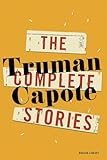
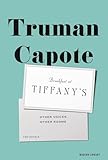 Breakfast at Tiffany’s & Other Voices, Other Rooms: Two Novels by Truman Capote: Holly Golightly is turning 55, and to mark her entry into late middle age, the Modern Library is reissuing Capote’s dazzling 1958 novella that made her and Tiffany’s Fifth Avenue showroom into American icons. The short novel is paired with Capote’s (also brief) debut novel Other Voices, Other Rooms, a strange and haunting semi-fictional evocation of Capote’s hauntingly strange Southern childhood. Modern Library will also reissue Capote’s Complete Stories in March. (Michael)
Breakfast at Tiffany’s & Other Voices, Other Rooms: Two Novels by Truman Capote: Holly Golightly is turning 55, and to mark her entry into late middle age, the Modern Library is reissuing Capote’s dazzling 1958 novella that made her and Tiffany’s Fifth Avenue showroom into American icons. The short novel is paired with Capote’s (also brief) debut novel Other Voices, Other Rooms, a strange and haunting semi-fictional evocation of Capote’s hauntingly strange Southern childhood. Modern Library will also reissue Capote’s Complete Stories in March. (Michael)
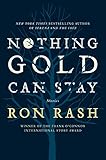 Nothing Gold Can Stay by Ron Rash: Ron Rash has earned a spot as one of the top fiction writers describing life in Appalachia with his previous books, The Cove, Serena, and One Foot in Eden. His newest collection of short stories tells of two drug-addicted friends stealing their former boss’s war trophies, of a prisoner on a chain-gang trying to convince a farmer’s young wife to help him escape, and of an eerie diving expedition to retrieve the body of a girl who drowned beneath a waterfall. (Kevin)
Nothing Gold Can Stay by Ron Rash: Ron Rash has earned a spot as one of the top fiction writers describing life in Appalachia with his previous books, The Cove, Serena, and One Foot in Eden. His newest collection of short stories tells of two drug-addicted friends stealing their former boss’s war trophies, of a prisoner on a chain-gang trying to convince a farmer’s young wife to help him escape, and of an eerie diving expedition to retrieve the body of a girl who drowned beneath a waterfall. (Kevin)
 The Love Song of Jonny Valentine by Teddy Wayne: If you have ever wondered what, if anything, is going on inside the head of one of those kiddie pop stars who seem animatronically designed to make the tween girls swoon, then Jonny Valentine may be for you. Winner of a Whiting Writers’ Award for his first novel Kapitoil, Wayne has built a reputation for offbeat wit in his humor columns for Vanity Fair and McSweeney’s, as well as “Shouts & Murmurs” pieces in The New Yorker. Here, he channels the voice of a lonely eleven-year-old pop megastar in a rollicking satire of America’s obsession with fame and pop culture. (Michael)
The Love Song of Jonny Valentine by Teddy Wayne: If you have ever wondered what, if anything, is going on inside the head of one of those kiddie pop stars who seem animatronically designed to make the tween girls swoon, then Jonny Valentine may be for you. Winner of a Whiting Writers’ Award for his first novel Kapitoil, Wayne has built a reputation for offbeat wit in his humor columns for Vanity Fair and McSweeney’s, as well as “Shouts & Murmurs” pieces in The New Yorker. Here, he channels the voice of a lonely eleven-year-old pop megastar in a rollicking satire of America’s obsession with fame and pop culture. (Michael)
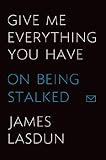 Give Me Everything You Have: On Being Stalked by James Lasdun: English poet, novelist and short story writer James Lasdun’s new book is a short memoir about a long and harrowing experience at the hands of a former student who set out to destroy him and through online accusations of sexual harassment and theft. J.M. Coetzee has called it “a reminder, as if any were needed, of how easily, since the arrival of the Internet, our peace can be troubled and our good name besmirched.” (Mark)
Give Me Everything You Have: On Being Stalked by James Lasdun: English poet, novelist and short story writer James Lasdun’s new book is a short memoir about a long and harrowing experience at the hands of a former student who set out to destroy him and through online accusations of sexual harassment and theft. J.M. Coetzee has called it “a reminder, as if any were needed, of how easily, since the arrival of the Internet, our peace can be troubled and our good name besmirched.” (Mark)
 Fight Song by Joshua Mohr: Joshua Mohr’s previous novels—Some Things That Meant The World To Me, Termite Parade, and Damascus—formed a loose trilogy, each book standing alone but all three concerned with a mildly overlapping cast of drifting and marginal characters in San Francisco. In Fight Song, Mohr is on to new territory, “way out in a puzzling universe known as the suburbs,” where a middle-aged man embarks on a quest to find happiness, to reconnect with his distant and distracted family, and to reverse a long slide into purposelessness. (Emily M.)
Fight Song by Joshua Mohr: Joshua Mohr’s previous novels—Some Things That Meant The World To Me, Termite Parade, and Damascus—formed a loose trilogy, each book standing alone but all three concerned with a mildly overlapping cast of drifting and marginal characters in San Francisco. In Fight Song, Mohr is on to new territory, “way out in a puzzling universe known as the suburbs,” where a middle-aged man embarks on a quest to find happiness, to reconnect with his distant and distracted family, and to reverse a long slide into purposelessness. (Emily M.)
March:
 Middle C by William H. Gass: Not many writers are still at the height of their powers at age 88. Hell, not many writers are still writing at 88. (We’re looking at you, Philip Roth.) But William H. Gass has always been an outlier, pursuing his own vision on his own timetable. His last novel (and magnum opus) The Tunnel took thirty years to write. Middle C, comparatively svelte at 400-odd pages, took a mere fifteen, and may be his most accessible fiction since 1968’s In The Heart of the Heart of the Country. It’s a character piece, concerning one Joseph Skizzen, a serial (and hapless) C.V. embellisher and connoisseur of more serious forms of infamy. The plot, such as it is, follows him from war-torn Europe, where he loses his father, to a career as a music professor in the Midwest. Not much happens – does it ever, in Gass? – but, sentence by sentence, you won’t read a more beautifully composed or stimulating novel this year. Or possibly any other. (Garth)
Middle C by William H. Gass: Not many writers are still at the height of their powers at age 88. Hell, not many writers are still writing at 88. (We’re looking at you, Philip Roth.) But William H. Gass has always been an outlier, pursuing his own vision on his own timetable. His last novel (and magnum opus) The Tunnel took thirty years to write. Middle C, comparatively svelte at 400-odd pages, took a mere fifteen, and may be his most accessible fiction since 1968’s In The Heart of the Heart of the Country. It’s a character piece, concerning one Joseph Skizzen, a serial (and hapless) C.V. embellisher and connoisseur of more serious forms of infamy. The plot, such as it is, follows him from war-torn Europe, where he loses his father, to a career as a music professor in the Midwest. Not much happens – does it ever, in Gass? – but, sentence by sentence, you won’t read a more beautifully composed or stimulating novel this year. Or possibly any other. (Garth)
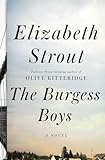 The Burgess Boys by Elizabeth Strout: Maine native Elizabeth Strout won the Pulitzer Prize for fiction in 2009 for Olive Kitteridge, her novel in the form of linked stories. Strout’s fourth novel, The Burgess Boys, is the story of the brothers Jim and Bob Burgess, who are haunted by the freak accident that killed their father when they were children in Maine. They have since fled to Brooklyn, but they’re summoned home by their sister Susan, who needs their help dealing with her troubled teenage son. Once they’re back home, long-buried tensions resurface that will change the Burgess boys forever. (Bill)
The Burgess Boys by Elizabeth Strout: Maine native Elizabeth Strout won the Pulitzer Prize for fiction in 2009 for Olive Kitteridge, her novel in the form of linked stories. Strout’s fourth novel, The Burgess Boys, is the story of the brothers Jim and Bob Burgess, who are haunted by the freak accident that killed their father when they were children in Maine. They have since fled to Brooklyn, but they’re summoned home by their sister Susan, who needs their help dealing with her troubled teenage son. Once they’re back home, long-buried tensions resurface that will change the Burgess boys forever. (Bill)
 The Fun Parts by Sam Lipsyte: Sam Lipsyte returns to short stories with his new book The Fun Parts. The collection contains some fiction previously published in The Paris Review, Playboy, and The New Yorker, including his excellent “The Climber Room,” which ends with a bizarre twist. Several of the stories, including “The Dungeon Master” and “Snacks,” explore the world from the perspectives of misfit teens. As with all of Lipstye’s stories, expect his absurdist humor and a just a touch of perversion. Get excited. (Patrick)
The Fun Parts by Sam Lipsyte: Sam Lipsyte returns to short stories with his new book The Fun Parts. The collection contains some fiction previously published in The Paris Review, Playboy, and The New Yorker, including his excellent “The Climber Room,” which ends with a bizarre twist. Several of the stories, including “The Dungeon Master” and “Snacks,” explore the world from the perspectives of misfit teens. As with all of Lipstye’s stories, expect his absurdist humor and a just a touch of perversion. Get excited. (Patrick)
 Red Doc> by Anne Carson: It’s been more than a decade since Carson, a poet and classicist, published The Autobiography of Red, a dazzling and powerful poetic novel that reinvents the myth of Herakles and Greyon: hero and monster reworked into a story of violently deep unrequited love. Red Doc> promises to be a sequel of sorts, with “a very different style,” “changed names,” and the spare preview is incredibly intriguing: “To live past the end of your myth is a perilous thing.” (Elizabeth)
Red Doc> by Anne Carson: It’s been more than a decade since Carson, a poet and classicist, published The Autobiography of Red, a dazzling and powerful poetic novel that reinvents the myth of Herakles and Greyon: hero and monster reworked into a story of violently deep unrequited love. Red Doc> promises to be a sequel of sorts, with “a very different style,” “changed names,” and the spare preview is incredibly intriguing: “To live past the end of your myth is a perilous thing.” (Elizabeth)
 A Thousand Pardons by Jonathan Dee: Author of The Privileges, arguably the best novel about haute New York in the boom years of the past decade, Dee returns with another tale of family life in the upper reaches of New York society, this time post-recession. When her husband loses his job as a partner at a white-shoe law firm, Helen Armstead finds a job at a PR firm, where she discovers she has an almost magical, and definitely lucrative, gift: she can convince powerful men to admit their mistakes. But this is a novel, so her professional success does not necessarily translate into success in her personal life. (Michael)
A Thousand Pardons by Jonathan Dee: Author of The Privileges, arguably the best novel about haute New York in the boom years of the past decade, Dee returns with another tale of family life in the upper reaches of New York society, this time post-recession. When her husband loses his job as a partner at a white-shoe law firm, Helen Armstead finds a job at a PR firm, where she discovers she has an almost magical, and definitely lucrative, gift: she can convince powerful men to admit their mistakes. But this is a novel, so her professional success does not necessarily translate into success in her personal life. (Michael)
 Speedboat by Renata Adler: This novel, first published in 1976, brings to mind the old saw about the Velvet Underground. Not everybody read it, but everybody who did went on to write a novel of his or her own. Adler is primarily known for her acerbic New Yorker fact pieces, but, like her omnicompetent contemporary Joan Didion, she is also a terrific fiction writer. This fragmented look at the life of an Adler-like journalist may be her Play It As It Lays. Writers still urgently press out-of-print copies on each other in big-city bars near last call. Now it’s getting the NYRB Classics treatment. (Garth)
Speedboat by Renata Adler: This novel, first published in 1976, brings to mind the old saw about the Velvet Underground. Not everybody read it, but everybody who did went on to write a novel of his or her own. Adler is primarily known for her acerbic New Yorker fact pieces, but, like her omnicompetent contemporary Joan Didion, she is also a terrific fiction writer. This fragmented look at the life of an Adler-like journalist may be her Play It As It Lays. Writers still urgently press out-of-print copies on each other in big-city bars near last call. Now it’s getting the NYRB Classics treatment. (Garth)
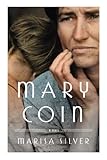 Mary Coin by Marisa Silver: Following the success of her novel The God of War, The New Yorker favorite Marisa Silver returns with Mary Coin, a novel inspired by Dorothea Lange’s iconic “Migrant Mother” photo. The book follows three characters: Mary, the mother in the photograph; Vera Dare, the photographer; and Walker Dodge, a contemporary-era professor of cultural history. Ben Fountain says it’s “quite simply one of the best books I’ve read in years,” and Meghan O’Rourke calls it “an extraordinarily wise and compassionate novel.” (Edan)
Mary Coin by Marisa Silver: Following the success of her novel The God of War, The New Yorker favorite Marisa Silver returns with Mary Coin, a novel inspired by Dorothea Lange’s iconic “Migrant Mother” photo. The book follows three characters: Mary, the mother in the photograph; Vera Dare, the photographer; and Walker Dodge, a contemporary-era professor of cultural history. Ben Fountain says it’s “quite simply one of the best books I’ve read in years,” and Meghan O’Rourke calls it “an extraordinarily wise and compassionate novel.” (Edan)
 How to Get Filthy Rich in Rising Asia by Mohsin Hamid: Hamid’s previous novels were The Reluctant Fundamentalist and Moth Smoke. His third borrows the structure of self-help books (chapter titles include “Avoid Idealists”, “Don’t Fall in Love”, and “Work For Yourself”) to follow a nameless man’s ascent from a childhood of rural poverty to success as a corporate tycoon in a metropolis in “rising Asia.” (Emily M.)
How to Get Filthy Rich in Rising Asia by Mohsin Hamid: Hamid’s previous novels were The Reluctant Fundamentalist and Moth Smoke. His third borrows the structure of self-help books (chapter titles include “Avoid Idealists”, “Don’t Fall in Love”, and “Work For Yourself”) to follow a nameless man’s ascent from a childhood of rural poverty to success as a corporate tycoon in a metropolis in “rising Asia.” (Emily M.)
 The Tragedy of Mr. Morn Vladimir Nabokov: I furrowed my brow when I saw Nabokov’s name on the preview list, imagining a horde of publishers rooting through his undies for hitherto undiscovered index cards. But this is a very old play, in the scheme of Nabokov’s life–written in 1923, published in Russian in 2008, published in English this spring. The play is about royalty, revolutionaries, allegories; “On the page,” writes Lesley Chamberlain for the TLS, ” the entire text creeps metonymically sideways. Its author weaves language into a tissue of reality hinting at some veiled, mysteriously interconnected, static truth beyond.” I’m not sure what that means, but I think I like it. (Lydia)
The Tragedy of Mr. Morn Vladimir Nabokov: I furrowed my brow when I saw Nabokov’s name on the preview list, imagining a horde of publishers rooting through his undies for hitherto undiscovered index cards. But this is a very old play, in the scheme of Nabokov’s life–written in 1923, published in Russian in 2008, published in English this spring. The play is about royalty, revolutionaries, allegories; “On the page,” writes Lesley Chamberlain for the TLS, ” the entire text creeps metonymically sideways. Its author weaves language into a tissue of reality hinting at some veiled, mysteriously interconnected, static truth beyond.” I’m not sure what that means, but I think I like it. (Lydia)
 The Book of My Lives by Aleksandar Hemon: Sarajevo-born, Chicago-based author Aleksandar Hemon—winner of the MacArthur “genius grant” and editor of Dalkey Archive’s stellar Best European Fiction series—abandons fiction for essay and memoir in his fifth book, The Book of My Lives. The title alludes to and, as far as we can tell, calls upon Hemon’s New Yorker essay “The Book of My Life,” about his former literature professor turned war criminal, Nikola Koljevic. Just as Hemon’s novel Lazarus Project straddled the fiction/nonfiction divide, The Book of My Lives isn’t strictly memoir, pushing boundaries of genre now from the nonfiction side. (Anne)
The Book of My Lives by Aleksandar Hemon: Sarajevo-born, Chicago-based author Aleksandar Hemon—winner of the MacArthur “genius grant” and editor of Dalkey Archive’s stellar Best European Fiction series—abandons fiction for essay and memoir in his fifth book, The Book of My Lives. The title alludes to and, as far as we can tell, calls upon Hemon’s New Yorker essay “The Book of My Life,” about his former literature professor turned war criminal, Nikola Koljevic. Just as Hemon’s novel Lazarus Project straddled the fiction/nonfiction divide, The Book of My Lives isn’t strictly memoir, pushing boundaries of genre now from the nonfiction side. (Anne)
 The Unchangeable Spots of Leopards by Kristopher Jansma: Kristopher Jansma, academic and Electric Literature blogger, drawer of daring and controversial parallels on the digital pages of our own august publication (Is The Killing like or not like Kafka?), publishes his debut novel on the first day of spring. The novel features young writers, young love, artistic competition, girls, jaunts. I predict that at least one blurber will reference This Side of Paradise. (Lydia)
The Unchangeable Spots of Leopards by Kristopher Jansma: Kristopher Jansma, academic and Electric Literature blogger, drawer of daring and controversial parallels on the digital pages of our own august publication (Is The Killing like or not like Kafka?), publishes his debut novel on the first day of spring. The novel features young writers, young love, artistic competition, girls, jaunts. I predict that at least one blurber will reference This Side of Paradise. (Lydia)
 A Map of Tulsa by Benjamin Lytal: In the 2003, “a young Oklahoman who work[ed] in New York” stole the eleventh issue of McSweeney’s from the likes of Joyce Carol Oates and T.C. Boyle with a story – well, scenario, really – called “Weena.” Maybe I only loved it so much because I, too, was from outlands like those it so lovingly described. Still, I’ve been keeping an eye out for that young Oklahoman, Benjamin Lytal, ever since. I assume that A Map of Tulsa, too, is about coming of age in Tulsa, a city that looks from the window of a passing car at night “like a mournful spaceship.” (Garth)
A Map of Tulsa by Benjamin Lytal: In the 2003, “a young Oklahoman who work[ed] in New York” stole the eleventh issue of McSweeney’s from the likes of Joyce Carol Oates and T.C. Boyle with a story – well, scenario, really – called “Weena.” Maybe I only loved it so much because I, too, was from outlands like those it so lovingly described. Still, I’ve been keeping an eye out for that young Oklahoman, Benjamin Lytal, ever since. I assume that A Map of Tulsa, too, is about coming of age in Tulsa, a city that looks from the window of a passing car at night “like a mournful spaceship.” (Garth)
 In Partial Disgrace by Charles Newman: Newman, the editor who put TriQuarterly on the map in the 1960s, was once spoken of in the same breath with the great dark humorists of postwar American writing. Even before his death, in 2006, his novels were falling out of print and his reputation fading. If there is any justice in the republic of letters (which is a big if), the belated publication of his incomplete masterwork, a sprawling trilogy set in a fictional Mitteleuropean nation to rival Musil’s Kakania, should put him permanently back on the map. (Garth)
In Partial Disgrace by Charles Newman: Newman, the editor who put TriQuarterly on the map in the 1960s, was once spoken of in the same breath with the great dark humorists of postwar American writing. Even before his death, in 2006, his novels were falling out of print and his reputation fading. If there is any justice in the republic of letters (which is a big if), the belated publication of his incomplete masterwork, a sprawling trilogy set in a fictional Mitteleuropean nation to rival Musil’s Kakania, should put him permanently back on the map. (Garth)
The Childhood of Jesus by J.M. Coetzee: J.M. Coetzee, Nobel laureate and two-time Booker Prize winner, continues to explore the plight of the outsider in his new allegorical novel, The Childhood of Jesus. It’s the story of an unnamed man and boy who cross an ocean to a strange land where, bereft of memories, they are assigned the names Simon and David before they set out to find the boy’s mother. They succeed, apparently, only to run afoul of the authorities, which forces them to flee by car through the mountains. One early reader has called the novel “profound and continually surprising.” (Bill)
April:
 Life After Life by Kate Atkinson: The beloved author of Case Histories, Behind the Scenes at the Museum, and Started Early, Took My Dog (among others) is out with the stor(ies) of Ursula Todd. In 1910, Todd is born during a snowstorm in England, but from then on there are parallel stories — one in which she dies at first breath, and one in which she lives through the tumultuous 20th century. As the lives of Ursula Todd continue to multiply, Atkinson asks what, then, is the best way to live, if one has multiple chances? (Janet)
Life After Life by Kate Atkinson: The beloved author of Case Histories, Behind the Scenes at the Museum, and Started Early, Took My Dog (among others) is out with the stor(ies) of Ursula Todd. In 1910, Todd is born during a snowstorm in England, but from then on there are parallel stories — one in which she dies at first breath, and one in which she lives through the tumultuous 20th century. As the lives of Ursula Todd continue to multiply, Atkinson asks what, then, is the best way to live, if one has multiple chances? (Janet)
 All That Is by James Salter: Upon return from service as a naval officer in Okinawa, Philip Bowman becomes a book editor during the “golden age” of publishing. The publisher’s blurb promises “Salter’s signature economy of prose” and a story about the “dazzling, sometimes devastating labyrinth of love and ambition.” In our interview with Salter in September, he told us it was “an intimate story about a life in New York publishing,” some 10 years in the making. From John Irving: “A beautiful novel, with sufficient love, heartbreak, vengeance, identity confusion, longing, and euphoria of language to have satisfied Shakespeare.” Tim O’Brien: “Salter’s vivid, lucid prose does exquisite justice to his subject—the relentless struggle to make good on our own humanity.” April will not come soon enough. (Sonya)
All That Is by James Salter: Upon return from service as a naval officer in Okinawa, Philip Bowman becomes a book editor during the “golden age” of publishing. The publisher’s blurb promises “Salter’s signature economy of prose” and a story about the “dazzling, sometimes devastating labyrinth of love and ambition.” In our interview with Salter in September, he told us it was “an intimate story about a life in New York publishing,” some 10 years in the making. From John Irving: “A beautiful novel, with sufficient love, heartbreak, vengeance, identity confusion, longing, and euphoria of language to have satisfied Shakespeare.” Tim O’Brien: “Salter’s vivid, lucid prose does exquisite justice to his subject—the relentless struggle to make good on our own humanity.” April will not come soon enough. (Sonya)
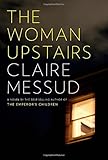 The Woman Upstairs by Claire Messud: The Emperor’s Children, Messud’s bestselling novel from 2006, did as much as anyone has to bridge the gap between the social novel and the novel of consciousness her husband, James Wood, has championed in his criticism. Now, Messud returns with the story of a Boston-area woman who becomes entangled with a Lebanese-Italian family that moves in nearby. Expect, among other things, insanely fine writing. (Garth)
The Woman Upstairs by Claire Messud: The Emperor’s Children, Messud’s bestselling novel from 2006, did as much as anyone has to bridge the gap between the social novel and the novel of consciousness her husband, James Wood, has championed in his criticism. Now, Messud returns with the story of a Boston-area woman who becomes entangled with a Lebanese-Italian family that moves in nearby. Expect, among other things, insanely fine writing. (Garth)
 The Interestings by Meg Wolitzer: In a review of her most recent book, 2011’s The Uncoupling, the San Francisco Chronicle declared that, “At this point in her career, Meg Wolitzer deserves to be a household name.” Wolitzer’s tenth novel begins at a summer camp for the arts in 1974, and follows a group of friends into the adulthood. They’re all talented, but talent isn’t enough, and as they grow up, their paths split: some are forced to exchange their childhood dreams for more conventional lives, while others find great success—and, as one might imagine, tensions arise from these differences. (Elizabeth)
The Interestings by Meg Wolitzer: In a review of her most recent book, 2011’s The Uncoupling, the San Francisco Chronicle declared that, “At this point in her career, Meg Wolitzer deserves to be a household name.” Wolitzer’s tenth novel begins at a summer camp for the arts in 1974, and follows a group of friends into the adulthood. They’re all talented, but talent isn’t enough, and as they grow up, their paths split: some are forced to exchange their childhood dreams for more conventional lives, while others find great success—and, as one might imagine, tensions arise from these differences. (Elizabeth)
 The Flamethrowers by Rachel Kushner: Rachel Kushner’s first novel, Telex from Cuba, was lauded for its evocative descriptions and its power of suspense. Kushner will surely call on both talents for The Flamethrowers, as her heroine first becomes immersed in a late ‘70s New York downtown scene peopled by artists and squatters, and then follows a motorcycle baron to Italy during the height of the Autonomist movement. Images are central to Kushner’s creative process: a ducati, a woman in war paint, and a F.T. Marinetti lookalike riding atop a cycle with a bullet-shaped sidecar were talismans (among others) for writing this book. (Anne)
The Flamethrowers by Rachel Kushner: Rachel Kushner’s first novel, Telex from Cuba, was lauded for its evocative descriptions and its power of suspense. Kushner will surely call on both talents for The Flamethrowers, as her heroine first becomes immersed in a late ‘70s New York downtown scene peopled by artists and squatters, and then follows a motorcycle baron to Italy during the height of the Autonomist movement. Images are central to Kushner’s creative process: a ducati, a woman in war paint, and a F.T. Marinetti lookalike riding atop a cycle with a bullet-shaped sidecar were talismans (among others) for writing this book. (Anne)
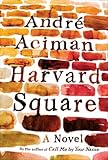 Harvard Square by André Aciman: In 1970s Cambridge, Massachusetts, a young Harvard graduate student from Egypt wants to be the consummate American, fully assimilated and ensconced in the ivory tower as a literature professor. Then he meets Kalaj — an Arab cab driver who denigrates American mass culture and captivates the student with his seedy, adventurous life. Harvard Square tells the story of this young student’s dilemma, caught between the lofty world of Harvard academia and the magnetic company of his new friend. (Janet)
Harvard Square by André Aciman: In 1970s Cambridge, Massachusetts, a young Harvard graduate student from Egypt wants to be the consummate American, fully assimilated and ensconced in the ivory tower as a literature professor. Then he meets Kalaj — an Arab cab driver who denigrates American mass culture and captivates the student with his seedy, adventurous life. Harvard Square tells the story of this young student’s dilemma, caught between the lofty world of Harvard academia and the magnetic company of his new friend. (Janet)
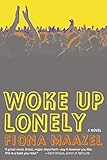 Woke Up Lonely by Fiona Maazel: Woke Up Lonely is Fiona Maazel’s first novel since being named a “5 Under 35” choice by the National Book Foundation. The book focuses on Thurlow Dan, the founder of the Helix, a cult that promises to cure loneliness. Ironically, Thurlow himself is profoundly lonely and longing for his ex-wife, Esme. The book has been compared to the work of Sam Lipsyte and Karen Russell, and if there’s one phrase that continually appears in early reviews and press materials, it is “action packed.” (Patrick)
Woke Up Lonely by Fiona Maazel: Woke Up Lonely is Fiona Maazel’s first novel since being named a “5 Under 35” choice by the National Book Foundation. The book focuses on Thurlow Dan, the founder of the Helix, a cult that promises to cure loneliness. Ironically, Thurlow himself is profoundly lonely and longing for his ex-wife, Esme. The book has been compared to the work of Sam Lipsyte and Karen Russell, and if there’s one phrase that continually appears in early reviews and press materials, it is “action packed.” (Patrick)
 The Dark Road by Ma Jian: Ma Jian, whose books and person are both banned from China, published his third novel The Dark Road in June (Yunchen Publishing House, Taipei); the English translation will be released by Penguin. The story: a couple determined to give birth to a second child in order to carry on the family line flee their village and the family planning crackdown. At Sampsonia Way, Tienchi Martin-Liao described it as “an absurd story” that uses “magical realism to describe the perverse reality in China.” The publisher describes it as “a haunting and indelible portrait of the tragedies befalling women and families at the hands of China’s one-child policy and of the human spirit’s capacity to endure even the most brutal cruelty.” Martin-Liao tells us that the book’s title, Yin Zhi Dao, also means vagina, or place of life and origin. (Sonya)
The Dark Road by Ma Jian: Ma Jian, whose books and person are both banned from China, published his third novel The Dark Road in June (Yunchen Publishing House, Taipei); the English translation will be released by Penguin. The story: a couple determined to give birth to a second child in order to carry on the family line flee their village and the family planning crackdown. At Sampsonia Way, Tienchi Martin-Liao described it as “an absurd story” that uses “magical realism to describe the perverse reality in China.” The publisher describes it as “a haunting and indelible portrait of the tragedies befalling women and families at the hands of China’s one-child policy and of the human spirit’s capacity to endure even the most brutal cruelty.” Martin-Liao tells us that the book’s title, Yin Zhi Dao, also means vagina, or place of life and origin. (Sonya)
 The Pink Hotel by Anna Stothard: Stothard’s second novel (after Isabel and Rocco) follows an unnamed 17-year-old narrator as she flies from London to L.A. for the funeral of Lily, a mother she never knew, the proprietess of The Pink Hotel. While the hotel’s residents throw a rave in Lily’s honor, her daughter steals a suitcase of Lily’s photos, letters, and clothes. These mementos set her on a journey around L.A., returning letters to their writers and photos to their subjects and uncovering the secrets of her mother’s life. Longlisted for the 2012 Orange Prize, The Pink Hotel has been optioned for production by True Blood’s Stephen Moyer and Anna Paquin. (Janet)
The Pink Hotel by Anna Stothard: Stothard’s second novel (after Isabel and Rocco) follows an unnamed 17-year-old narrator as she flies from London to L.A. for the funeral of Lily, a mother she never knew, the proprietess of The Pink Hotel. While the hotel’s residents throw a rave in Lily’s honor, her daughter steals a suitcase of Lily’s photos, letters, and clothes. These mementos set her on a journey around L.A., returning letters to their writers and photos to their subjects and uncovering the secrets of her mother’s life. Longlisted for the 2012 Orange Prize, The Pink Hotel has been optioned for production by True Blood’s Stephen Moyer and Anna Paquin. (Janet)
 Our Man in Iraq by Robert Perišic: Perišic is one of the leading new writers to have emerged from Croatia after the fall of the Iron Curtain. In this, his first novel to appear stateside, he offers the funny and absurd tale of two cousins from Zagreb who get caught up in the American Invasion of Iraq, circa 2003. Perišic speaks English, and assisted with the translation, so his voice should come through intact, and a blurb from Jonathan Franzen never hurts. (Garth)
Our Man in Iraq by Robert Perišic: Perišic is one of the leading new writers to have emerged from Croatia after the fall of the Iron Curtain. In this, his first novel to appear stateside, he offers the funny and absurd tale of two cousins from Zagreb who get caught up in the American Invasion of Iraq, circa 2003. Perišic speaks English, and assisted with the translation, so his voice should come through intact, and a blurb from Jonathan Franzen never hurts. (Garth)
May:
And the Mountains Echoed by Khaled Hosseini: Few details have been released so far about the third novel from international publishing juggernaut Hosseini (The Kite Runner, A Thousand Splendid Suns). In a statement posted to Penguin’s website, Hosseini explains, “My new novel is a multi-generational family story as well, this time revolving around brothers and sisters, and the ways in which they love, wound, betray, honor, and sacrifice for each other.” (Kevin)
 My Struggle: Book Two: A Man in Love by Karl Ove Knausgaard: The first part of Knausgaard’s six-part behemoth was the single most stirring novel I read in 2012. Or is the word memoir? Anyway, this year sees the publication of Part Two, which apparently shifts the emphasis from Knausgaard’s childhood and the death of his father to his romantic foibles as an adult. But form trumps content in this book, and I’d read 400 pages of Knausgaard dilating on trips to the dentist. There’s still time to run out and catch up on Part One before May rolls around. I can’t imagine many readers who finish it won’t want to keep going. (Garth)
My Struggle: Book Two: A Man in Love by Karl Ove Knausgaard: The first part of Knausgaard’s six-part behemoth was the single most stirring novel I read in 2012. Or is the word memoir? Anyway, this year sees the publication of Part Two, which apparently shifts the emphasis from Knausgaard’s childhood and the death of his father to his romantic foibles as an adult. But form trumps content in this book, and I’d read 400 pages of Knausgaard dilating on trips to the dentist. There’s still time to run out and catch up on Part One before May rolls around. I can’t imagine many readers who finish it won’t want to keep going. (Garth)
 You Are One of Them by Elliott Holt: You Are One of Them is Pushcart Prize-winner Elliott Holt’s debut novel. You might be forgiven for thinking she’d already published a few books, as Holt has been a fixture of the literary Twittersphere for years. Holt’s debut is a literary suspense novel spanning years, as a young woman, raised in politically charged Washington D.C. of the 1980s, goes to Moscow to investigate the decades-old death of her childhood friend. (Patrick)
You Are One of Them by Elliott Holt: You Are One of Them is Pushcart Prize-winner Elliott Holt’s debut novel. You might be forgiven for thinking she’d already published a few books, as Holt has been a fixture of the literary Twittersphere for years. Holt’s debut is a literary suspense novel spanning years, as a young woman, raised in politically charged Washington D.C. of the 1980s, goes to Moscow to investigate the decades-old death of her childhood friend. (Patrick)
 The Fall of Arthur by J.R.R. Tolkien: In a letter to his American publisher two decades after abandoning The Fall of Arthur, Tolkien expressed regret that he’d left the epic poem unfinished (some suggest it was cast aside as he focused on writing The Hobbit, published in 1937). Nearly eighty years later, the work has been edited and annotated by his son, Christopher, who has written three companion essays that explore the text and his father’s use of Arthurian legend in Middle Earth. Tolkien fans will be grateful for the uncharted territory but unused to the book’s bulk, or lack thereof: in the American edition, poem, notes, and essays clock in just shy of 200 pages long. (Elizabeth)
The Fall of Arthur by J.R.R. Tolkien: In a letter to his American publisher two decades after abandoning The Fall of Arthur, Tolkien expressed regret that he’d left the epic poem unfinished (some suggest it was cast aside as he focused on writing The Hobbit, published in 1937). Nearly eighty years later, the work has been edited and annotated by his son, Christopher, who has written three companion essays that explore the text and his father’s use of Arthurian legend in Middle Earth. Tolkien fans will be grateful for the uncharted territory but unused to the book’s bulk, or lack thereof: in the American edition, poem, notes, and essays clock in just shy of 200 pages long. (Elizabeth)
Americanah by Chimamanda Ngozi Adichie: The author of the critically acclaimed novels Half of a Yellow Sun and Purple Hibiscus, both set in Adichie’s home country of Nigeria, now turns her keen eye to the trials of cultural assimilation for Africans in America and England. In the novel, a young Nigerian couple leave their homeland – she to America for an education, he to a far more unsettled, undocumented life in England. In their separate ways, each confront issues of race and identity they would never have faced in Nigeria, where they eventually reunite. (Michael)
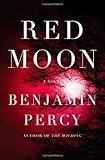 Red Moon by Benjamin Percy: Percy, whose previous books include the novel The Wilding and the story collection Refresh, Refresh, imagines a world wherein werewolves have always lived among us, uneasily tolerated, a hidden but largely controlled menace, required by law to take a transformation-inhibiting drug. He describes his new novel as “a narrative made of equal parts supernatural thriller, love story and political allegory.” (Emily M.)
Red Moon by Benjamin Percy: Percy, whose previous books include the novel The Wilding and the story collection Refresh, Refresh, imagines a world wherein werewolves have always lived among us, uneasily tolerated, a hidden but largely controlled menace, required by law to take a transformation-inhibiting drug. He describes his new novel as “a narrative made of equal parts supernatural thriller, love story and political allegory.” (Emily M.)
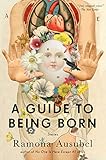 A Guide to Being Born by Ramona Ausubel: A short story collection that includes the author’s New Yorker debut, “Atria”. If that piece is any indication, the book is more than a bit fabulist – the plot involves a girl who finds herself pregnant and worries she’ll give birth to an animal. The specter of parenthood, as the title suggests, appears in numerous guises, as does the reinvention that marked the protagonists of her novel (the genesis of which she wrote about in our own pages). (Thom)
A Guide to Being Born by Ramona Ausubel: A short story collection that includes the author’s New Yorker debut, “Atria”. If that piece is any indication, the book is more than a bit fabulist – the plot involves a girl who finds herself pregnant and worries she’ll give birth to an animal. The specter of parenthood, as the title suggests, appears in numerous guises, as does the reinvention that marked the protagonists of her novel (the genesis of which she wrote about in our own pages). (Thom)
The Hanging Garden by Patrick White: The last work of Nobel Laureate Patrick White gives his homeland an Elysian feel. At the beginning, we meet two orphans, Eirene Sklavos and Gilbert Horsfall, whose parents both died in separate conflicts early on in the second World War. They escape to a house in suburban Sydney and bond in a lush little garden. As with most things published posthumously, the story is a little bit scattershot, but early reviews out of Oz (and our own take) say the book is worthy of its author. (Thom)
 Love Is Power, or Something Like That by A. Igoni Barrett: Barrett’s middle name, Igonibo, means stranger, though he’s no stranger to all things literary: he chronicled his childhood bookishness in our pages last year, and his father is Jamaican-born poet Lindsay Barrett who settled in Nigeria, where the younger Barrett was born and still lives. The streets of Lagos provide the backdrop for his second story collection, Love Is Power, or Something Like That. His first was called From the Cave of Rotten Teeth, and rotting teeth seems to be something of a recurring motif. It’s picked up at least tangentially in this book with “My Smelling Mouth Problem,” a story where the protagonist’s halitosis causes disturbances on a city bus ride. (Anne)
Love Is Power, or Something Like That by A. Igoni Barrett: Barrett’s middle name, Igonibo, means stranger, though he’s no stranger to all things literary: he chronicled his childhood bookishness in our pages last year, and his father is Jamaican-born poet Lindsay Barrett who settled in Nigeria, where the younger Barrett was born and still lives. The streets of Lagos provide the backdrop for his second story collection, Love Is Power, or Something Like That. His first was called From the Cave of Rotten Teeth, and rotting teeth seems to be something of a recurring motif. It’s picked up at least tangentially in this book with “My Smelling Mouth Problem,” a story where the protagonist’s halitosis causes disturbances on a city bus ride. (Anne)
 The Unwinding: An Inner History of the New America by George Packer: George Packer reveals the state of affairs in America in his ominously-titled new book, a history told in biographical inspections of its various residents (read about one, a lobbyist, in a truly riveting excerpt in The New Yorker). The bad news, probably, is that American is fucked. The good news, I learned from an interview in The Gunn Oracle, the paper of record at Packer’s high school, is that Packer didn’t become a proper journalist until age 40, which is sort of heartening, and may officially qualify him for Bloom status. (More bad news: no posted vacancies at The Gunn Oracle.) (Lydia)
The Unwinding: An Inner History of the New America by George Packer: George Packer reveals the state of affairs in America in his ominously-titled new book, a history told in biographical inspections of its various residents (read about one, a lobbyist, in a truly riveting excerpt in The New Yorker). The bad news, probably, is that American is fucked. The good news, I learned from an interview in The Gunn Oracle, the paper of record at Packer’s high school, is that Packer didn’t become a proper journalist until age 40, which is sort of heartening, and may officially qualify him for Bloom status. (More bad news: no posted vacancies at The Gunn Oracle.) (Lydia)
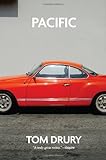 Pacific by Tom Drury: Drury’s fans will be ecstatic to learn that his new novel focuses once again on the inhabitants of Grouse County, Iowa, where two of his four previous books, The End of Vandalism and Hunts in Dreams, also take place. In this new novel, Tiny Darling’s son Micah travels to L.A. to reunite with his mother who abandoned him years before, while back in the Midwest, a mysterious woman unsettles everyone she meets. The novel tells two parallel tales, plumbing both the comic and tragic of life. Yiyun Li says that Drury is a “rare master of the art of seeing.” This novel is sure to prove that—yet again. (Edan)
Pacific by Tom Drury: Drury’s fans will be ecstatic to learn that his new novel focuses once again on the inhabitants of Grouse County, Iowa, where two of his four previous books, The End of Vandalism and Hunts in Dreams, also take place. In this new novel, Tiny Darling’s son Micah travels to L.A. to reunite with his mother who abandoned him years before, while back in the Midwest, a mysterious woman unsettles everyone she meets. The novel tells two parallel tales, plumbing both the comic and tragic of life. Yiyun Li says that Drury is a “rare master of the art of seeing.” This novel is sure to prove that—yet again. (Edan)
 Forty-One False Starts: Essays on Artists and Writers by Janet Malcolm: The title of this collection comes from a 1994 New Yorker profile of the artist David Salle, in which Malcolm tried in 41 different ways, without success, to penetrate the carefully constructed shell of an artist who had made a bundle during the go-go 1980s but was terrified that he was already forgotten by the art world, a has-been. Malcolm trains her laser eye on a variety of other subjects, including Edward Weston‘s nudes, the German photographer Thomas Struth, Edith Wharton, the Gossip Girl novels, and the false starts on her own autobiography. (Bill)
Forty-One False Starts: Essays on Artists and Writers by Janet Malcolm: The title of this collection comes from a 1994 New Yorker profile of the artist David Salle, in which Malcolm tried in 41 different ways, without success, to penetrate the carefully constructed shell of an artist who had made a bundle during the go-go 1980s but was terrified that he was already forgotten by the art world, a has-been. Malcolm trains her laser eye on a variety of other subjects, including Edward Weston‘s nudes, the German photographer Thomas Struth, Edith Wharton, the Gossip Girl novels, and the false starts on her own autobiography. (Bill)
June:
 Transatlantic by Colum McCann: Known for deftly lacing his fiction with historical events – such as the high-wire walk between the twin towers that opened his National Book Award-winning novel, Let the Great World Spin – McCann threads together three very different journeys to Ireland in his new novel, Transatlantic. The first was Frederick Douglass’s trip to denounce slavery in 1845, just as the potato famine was beginning; the second was the first transatlantic flight, in 1919, by Jack Alcock and Arthur Brown; and the third was former U.S. Sen. George Mitchell’s repeated crossings to broker the 1998 Good Friday Agreement. In an interview, McCann said it’s the aftermath of such large historic events that interests him as a novelist: “What happens in the quiet moments? What happens when the plane has landed?” (Bill)
Transatlantic by Colum McCann: Known for deftly lacing his fiction with historical events – such as the high-wire walk between the twin towers that opened his National Book Award-winning novel, Let the Great World Spin – McCann threads together three very different journeys to Ireland in his new novel, Transatlantic. The first was Frederick Douglass’s trip to denounce slavery in 1845, just as the potato famine was beginning; the second was the first transatlantic flight, in 1919, by Jack Alcock and Arthur Brown; and the third was former U.S. Sen. George Mitchell’s repeated crossings to broker the 1998 Good Friday Agreement. In an interview, McCann said it’s the aftermath of such large historic events that interests him as a novelist: “What happens in the quiet moments? What happens when the plane has landed?” (Bill)
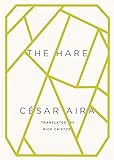 The Hare by César Aira: A recent bit of contrarianism in The New Republic blamed the exhaustive posthumous marketing of Roberto Bolaño for crowding other Latin American writers out of the U.S. marketplace. If anything, it seems to me, it’s the opposite: the success of The Savage Detectives helped publishers realize there was a market for Daniel Sada, Horacio Castellanos Moya, and the fascinating Argentinian César Aira. The past few years have seen seven of Aira’s many novels translated into English. Some of them, like Ghosts, are transcendently good, but none has been a breakout hit. Maybe the reissue of The Hare, which appeared in the U.K. in 1998, will be it. At the very least, it’s the longest Aira to appear in English: a picaresque about a naturalist’s voyage into the Argentinean pampas. (Garth)
The Hare by César Aira: A recent bit of contrarianism in The New Republic blamed the exhaustive posthumous marketing of Roberto Bolaño for crowding other Latin American writers out of the U.S. marketplace. If anything, it seems to me, it’s the opposite: the success of The Savage Detectives helped publishers realize there was a market for Daniel Sada, Horacio Castellanos Moya, and the fascinating Argentinian César Aira. The past few years have seen seven of Aira’s many novels translated into English. Some of them, like Ghosts, are transcendently good, but none has been a breakout hit. Maybe the reissue of The Hare, which appeared in the U.K. in 1998, will be it. At the very least, it’s the longest Aira to appear in English: a picaresque about a naturalist’s voyage into the Argentinean pampas. (Garth)
Taipei by Tao Lin: Indie darling Tao Lin officially enters the world of big six publishing with his eighth published work, Taipei, an autobiographical novel beginning in 2009 and concerning a few years in the life of a 25-year-old protagonist moving from Taiwan to New York City and Las Vegas. In an Observer interview from 2011, Lin said that the book “contains a marriage, somewhat extreme recreational drug usage, parents, [and] a book tour” – all of which should be familiar subjects to people who’ve followed Lin’s exploits on Twitter, Tumblr and his blog over the past few years. (And especially if you’ve been one of his “interns.”) (Nick)
 In the House upon the Dirt between the Lake and the Woods by Matt Bell: Matt Bell’s novel is an exploration of parenthood and marriage, and it carries the premise and the force of myth: a woman who can sing objects into being and a man who longs for fatherhood get married and leave their hectic lives for a quiet homestead by the side of a remote lake. But as pregnancy after pregnancy fails, the wife’s powers take a darker turn—she sings the stars from the sky—and their grief transforms not only their marriage but the world around them. (Emily M.)
In the House upon the Dirt between the Lake and the Woods by Matt Bell: Matt Bell’s novel is an exploration of parenthood and marriage, and it carries the premise and the force of myth: a woman who can sing objects into being and a man who longs for fatherhood get married and leave their hectic lives for a quiet homestead by the side of a remote lake. But as pregnancy after pregnancy fails, the wife’s powers take a darker turn—she sings the stars from the sky—and their grief transforms not only their marriage but the world around them. (Emily M.)
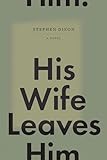 His Wife Leaves Him by Stephen Dixon: Stephen Dixon, a writer known for rendering unbearable experiences, has built his 15th novel around a premise that is almost unbearably simple: A man named Martin is thinking about the loss of his wife, Gwen. Dixon’s long and fruitful career includes more than 500 shorts stories, three O. Henry Prizes, two Pushcart Prizes and a pair of nominations for the National Book Award. His Wife Leaves Him, according to its author, “is about a bunch of nouns: love, guilt, sickness, death, remorse, loss, family, matrimony, sex, children, parenting, aging, mistakes, incidents, minutiae, birth, music, jobs, affairs, memory, remembering, reminiscence, forgetting, repression, dreams, reverie, nightmares, meeting, dating, conceiving, imagining, delaying, loving.” (Bill)
His Wife Leaves Him by Stephen Dixon: Stephen Dixon, a writer known for rendering unbearable experiences, has built his 15th novel around a premise that is almost unbearably simple: A man named Martin is thinking about the loss of his wife, Gwen. Dixon’s long and fruitful career includes more than 500 shorts stories, three O. Henry Prizes, two Pushcart Prizes and a pair of nominations for the National Book Award. His Wife Leaves Him, according to its author, “is about a bunch of nouns: love, guilt, sickness, death, remorse, loss, family, matrimony, sex, children, parenting, aging, mistakes, incidents, minutiae, birth, music, jobs, affairs, memory, remembering, reminiscence, forgetting, repression, dreams, reverie, nightmares, meeting, dating, conceiving, imagining, delaying, loving.” (Bill)
 Seiobo There Below by László Krasznahorkai: The novels of the great Hungarian writer László Krasznahorkai have recently begun to break through with American audiences. Thus far, however, we’ve only glimpsed one half of his oeuvre: the one that deals (darkly, complexly) with postwar Europe. Krasznahorkai has also long taken an interest in East Asia, where he’s spent time in residence. Seiobo There Below, one of several novels drawing on this experience, shows a Japanese goddess visiting disparate places and times, in search of beauty. (Garth)
Seiobo There Below by László Krasznahorkai: The novels of the great Hungarian writer László Krasznahorkai have recently begun to break through with American audiences. Thus far, however, we’ve only glimpsed one half of his oeuvre: the one that deals (darkly, complexly) with postwar Europe. Krasznahorkai has also long taken an interest in East Asia, where he’s spent time in residence. Seiobo There Below, one of several novels drawing on this experience, shows a Japanese goddess visiting disparate places and times, in search of beauty. (Garth)
 Carnival by Rawi Hage: True to its title, Carnival – which takes place in a city loosely based on the author’s hometown of Montreal – takes the reader on a tour of a place well-populated with odd and eccentric characters. The protagonist, Fly, is a cab driver with a penchant for binge reading. We learn that he chose his name to draw a contrast with a group called the Spiders. The Spiders are a loose collection of predatory cab drivers, who choose to wait for their customers rather than to hunt them on the streets. Fly himself, too, is no slouch when it comes to weirdness – he says that his mother gave birth to him in front of an audience of seals. (Thom)
Carnival by Rawi Hage: True to its title, Carnival – which takes place in a city loosely based on the author’s hometown of Montreal – takes the reader on a tour of a place well-populated with odd and eccentric characters. The protagonist, Fly, is a cab driver with a penchant for binge reading. We learn that he chose his name to draw a contrast with a group called the Spiders. The Spiders are a loose collection of predatory cab drivers, who choose to wait for their customers rather than to hunt them on the streets. Fly himself, too, is no slouch when it comes to weirdness – he says that his mother gave birth to him in front of an audience of seals. (Thom)
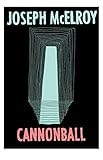 Cannonball by Joseph McElroy: Of the American experimental novelists of the 1960s and 1970s, Joseph McElroy may be the most idiosyncratic. He specializes in what you might call information architecture, overloading his narratives with nonfictional data while strategically withholding the kinds of exposition that are conventional in fiction. The results speak for themselves: moments of startling resonance, power, mystery…and topicality. His work has previously tackled the Pinochet regime, artificial intelligence, and, in his terrific recent story collection, Night Soul, terrorism. Now he turns his attention to the Iraq War. (Garth)
Cannonball by Joseph McElroy: Of the American experimental novelists of the 1960s and 1970s, Joseph McElroy may be the most idiosyncratic. He specializes in what you might call information architecture, overloading his narratives with nonfictional data while strategically withholding the kinds of exposition that are conventional in fiction. The results speak for themselves: moments of startling resonance, power, mystery…and topicality. His work has previously tackled the Pinochet regime, artificial intelligence, and, in his terrific recent story collection, Night Soul, terrorism. Now he turns his attention to the Iraq War. (Garth)
 On the Floor by Aifric Campbell: Banker-turned-novelist Aifric Campbell takes on the testosterone of the eighties. At Morgan Stanley, she saw firsthand the excesses of the era, which drove young female analysts to develop “contempt” for other women. As a product of that environment, her main character, Geri, feels like a “skirt among men.” She lacquers her ambitions with conspicuously feminine gestures and modes of dress. In an interview with the Guardian, Campbell pointed out that she used to race greyhounds, which gave her a “certain logic” that helped her in banking and writing. (Thom)
On the Floor by Aifric Campbell: Banker-turned-novelist Aifric Campbell takes on the testosterone of the eighties. At Morgan Stanley, she saw firsthand the excesses of the era, which drove young female analysts to develop “contempt” for other women. As a product of that environment, her main character, Geri, feels like a “skirt among men.” She lacquers her ambitions with conspicuously feminine gestures and modes of dress. In an interview with the Guardian, Campbell pointed out that she used to race greyhounds, which gave her a “certain logic” that helped her in banking and writing. (Thom)
July:
Love, Dishonor, Marry, Die, Cherish, Perish by David Rakoff: Rakoff passed away last summer at the age of 47, shortly after completing this slender novel “written entirely in verse.” His previous books have been largely satirical, so this final work is a departure: stretching across the country and the twentieth century, the novel’s stories are linked by “acts of generosity or cruelty.” Ira Glass, who brought Rakoff to the airwaves for more than a decade, has described the book as “very funny and very sad, which is my favorite combination” (a fair descriptor of much of Rakoff’s radio work, like this heartbreaking performance from the live episode of “This American Life” staged just a few months before his death.) (Elizabeth)
Five Star Billionaire by Tash Aw: In his third novel, Aw writes about Malaysian immigrants to contemporary Shanghai, featuring an ensemble cast who hail from diverse backgrounds; their stories are interwoven, and counterpointed with the lives they left behind. Aw, who was a practicing lawyer while writing his first novel, The Harmony Silk Factory, won accolades for his debut: longlisted for Man Booker Prize, International Impac Dublin Award and the Guardian First Book Prize; winner of the Whitbread First Novel Award as well as the Commonwealth Writers Prize for Best First Novel (Asia Pacific region). (Sonya)
August:
Night Film by Marisha Pessl: This much-anticipated, oft-delayed follow-up to Pessl’s bestselling Special Topics in Calamity Physics originally set to come out in 2010 is now scheduled – no, this time they really mean it – in the fall. The novel is a “psychological literary thriller” about a young New Yorker who sets out to investigate the apparent suicide of Ashley Cordova, daughter of a reclusive European movie director. (Michael)
The Infatuations by Javier Marías: Javier Marías’s new book, translated by Marguerite Jull Costa, is his 14th novel to be published in English. It was awarded Spain’s National Novel Prize last October, but Marías turned it down out of an aversion to receiving public money. It’s the story of a woman’s obsession with an apparently happy couple who inexplicably disappear. It’s his first novel to be narrated from a woman’s perspective, so it will be interesting to see how Marias manages to accommodate his penchant for detailed descriptions of ladies crossing and uncrossing their legs. (Mark)
Clare of the Sea-Light by Edwidge Danticat: My time at the University of Miami overlapped with Danticat’s, though unfortunately I never took her creative writing course. I did, however, see her speak at an event for the English department during my junior year. She was astounding. There are prose stylists in this world and then there are storytellers, and rare are people like Danticat who are both. She read from her memoir Brother, I’m Dying, which features one of the most devastating and personal depictions of our wretched immigration system ever written. Haiti has always been an remarkable place – a nation built with equal measures of hope, passion, charm, malfeasance and tragedy. In this forthcoming story collection, Clare of the Sea-Light – which draws its title from a piece she originally published in Haiti Noir – we can expect the prodigiously talented author to render each aspect of the place beautifully. (Nick)
Necessary Errors by Caleb Crain: Caleb Crain’s debut novel, which concerns the topic of “youth,” borrows its title from W. H. Auden’s 1929 poem “[It was Easter as I walked in the public gardens]” and takes place in the Czech Republic during the last decade of the 20th century. Look for Crain, a journalist, critic and banished member of the NYPL’s Central Library Plan advisory committee, to use research and insight from his previous book – a provocative look at male friendship, personal lives, and literary creation – in order to give Jacob Putnam and the rest of the characters in Necessary Errors a great deal of interwoven influences, covert desires and realistic interaction. (Nick)
September:
Enon by Paul Harding: In 2009, the tiny Bellevue Literary Press published Harding’s debut novel, Tinkers, which went on to win the Pulitzer Prize. Tinkers tells the story of George Washington Crosby, an old man reliving the memories of his life as he dies surround by family. Enon, named for the Massachusetts town where Crosby died, is about his grandson, Charlie Crosby, and Charlie’s daughter Kate. (Janet)
October:
The Signature of All Things by Elizabeth Gilbert: Elizabeth Gilbert’s mega-bestselling Eat Pray Love put her on Time Magazine’s list of most influential people in the world, and then Julia Roberts played her in the movie adaptation. What many fans of that memoir don’t know is that Gilbert started her career as a fiction writer, penning a short story collection, Pilgrims, and the novel, Stern Men, which was a New York Times Notable Book in 2000. Now, 13 years later, she returns to the form with the publication of “a big, sprawling, epic historical novel that takes place from 1760 to 1880, following the fortunes of a family called the Whittakers, who make their name in the early botanical exploration/proto-pharmaceutical business trade.” That description is from Gilbert herself, taken from this candid, illuminating and entertaining interview with Rachel Khong for The Rumpus. (Edan)
Dissident Gardens by Jonathan Lethem: Sunnyside Queens has long held a contrarian perspective. In the 1920s, as urban development projects washed over the outer boroughs, the folks in Sunnyside did all they could to keep the place from turning into a cookie-cutter suburb. Driveways were banned and garages were disallowed. Instead of lawns, the neighborhood’s designers recommended long courtyards that spanned the entire length of blocks – these were meant to encourage mingling and space sharing. It’s no doubt this spirit of dissent, skepticism and opinionated egalitarianism that’s drawn Jonathan Lethem to the neighborhood as the centerpiece for his new novel, a “family epic,” which focuses on three generations of American leftists growing up in the outer borough. (Nick)
Unknown:
Bleeding Edge by Thomas Pynchon: Washington Post critic Ron Charles broke the news recently that Thomas Pynchon will have a new book out from Penguin this fall called Bleeding Edge. (Though Penguin says the book has not yet been scheduled). Charles said the news of the new book was confirmed by two Penguin employees and that “everything is tentative” at this time. More as we know it, folks. (Max)
Subtle Bodies by Norman Rush: There’s still not much to report on Rush’s latest, a novel of love and friendship set in upstate New York on the eve of the Iraq War. In October, though Granta Books in the U.K. announced an autumn 2013 publication date, so here’s hoping… (Garth)
The Dying Grass by William T. Vollmann: The fifth of Vollmann’s Seven Dreams books to appear, The Dying Grass will most likely not see print until summer of 2015, according to his editor. First up is Last Stories, a collection of ghost stories slated to hit bookstores next year. Assuming there still are bookstores next year. (Garth)
Your Name Here by Helen DeWitt: Your Name Here seems to be stuck in a holding pattern at Noemi Press, befitting, one supposes, its tortured publication history. In a recent Believer interview, DeWitt suggested that the version that appears in print, if it appears in print, may not be the same as the .pdf she was selling on her website a few years back. Chunks may have been spun off into other works of fiction. Whatever the damn thing ends up looking like, we eagerly await it. (Garth)
Escape from the Children’s Hospital by Jonathan Safran Foer: Foer returns to childhood, to trauma, and to interwoven voices and storylines. The childhood here is Foer’s own, though, so this may mark a kind of departure. We’ll have to wait and see, as no publication date has been set. (Garth)
More from The Millions:
The good stuff: The Millions’ Notable articles
The motherlode: The Millions’ Books and Reviews
Like what you see? Learn about 5 insanely easy ways to Support The Millions, and follow The Millions on Twitter, Facebook, Tumblr.








